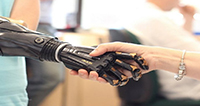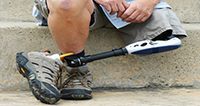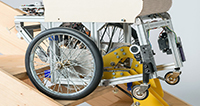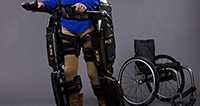The North-West University’s (NWU’s) engineers and biokineticists are preparing to take on universities from around the world in the 2024 International Cybathlon, which will see athletes with physical disabilities competing to complete everyday tasks using state-of-the-art technical assistance systems.
Prof Leenta Grobler, group leader in the medical device development group within the Faculty of Engineering, says they will be competing in four categories: powered arms, powered legs, powered full-body exoskeletons, and powered wheelchairs.
For this high-powered competition, Prof Grobler’s medical device development group is pooling its expertise with that of the Physical Activity, Sport and Recreation (PhASRec) research focus area in the Faculty of Health Sciences.
PhASRec brings biomechanics expertise to the table, while Prof Grobler’s group has expertise in advanced manufacturing (3D printing and carbon fibre-based structures), robotics and mobile app development within a healthcare setting.
“We are very fortunate to have a combination of excellent minds collaborating on this endeavour,” says Prof Grobler.
“Even at this early stage Dr Mark Kramer and Prof Hanlie Moss from PhaSRec are adding great value to our product development approach. Adding postgraduate student and amputee Ian Thomson as both pilot and engineer into the mix, is priceless,” she adds.
The Faculty of Engineering has been working in the medical device and digital health field since 2015, and developed NeuHand™, a hand rehabilitation system that consists of an exoskeleton and app to monitor and manage the rehabilitation process.
PhASRec has also not been resting on its laurels and is looking into lower limb rehabilitation following injury and knee replacement surgery.
Their combined expertise in human movement and assistive robotics is a powerful blend for the 2024 Cybathlon.
Scientists perform under pressure
“It is known the world over that invention is born from necessity, often under immense pressure. Competitions are often used to get the best out of scientists; they invent remarkable new technologies in their pursuit of a gold medal and inadvertently produce solutions to everyday problems in society,” says Prof Grobler.
Everyday tasks such as making coffee or frying eggs without breaking anything are a challenge with robotic hands, as is climbing stairs with robotic legs.
“In pursuing perfection in these seemingly menial tasks and actions, engineers and scientists prepare better care for the millions of people worldwide who rely on some sort of assistive device to improve their quality of life following an injury or amputation.”
According to Prof Grobler, there are more than 1,6 million people with limb amputations in the United States alone. In South Africa, the 2011 census data indicated that about three million people are living with disabilities, approximately 7,5% of the country's population.
Presently there is no data available on how many of these people have undergone amputation surgery, but it is estimated to be high – considering the prevalence of diabetes, cardiovascular disease, and trauma.
Prof Grobler says it is important to improve the daily lives of people with disabilities or physical weaknesses. Unfortunately, current assistive technology does not fully address their needs – for a number of reasons.
Drawbacks of assistive devices
People with disabilities are often disappointed with their devices’ performance and choose not to use them. The main objection is that designs ignore user needs, such as individual preferences for device appearance; sizing and fitting for comfort and function; effort and time required to put on and take off; as well as device durability and weight.
Beyond the design issues, devices are also expensive. Cost shuts many people out of using them, regardless of how well they work.
To address these issues the Cybathlon or Bionic Olympics competition was initiated in 2013.
“By 2020, it had 53 teams from 20 countries competing to create the ultimate enabling device, allowing people with disabilities to perform everyday tasks and overcoming challenges able-bodied individuals never even realise exist,” says Prof Grobler.
The NWU team is currently analysing the organisers' documentation for the pilot requirements for each of the device categories.
“Relying on the principles of design thinking, the team will ensure that a user-centric development process is followed to create a device that is not only functional and aesthetically pleasing, but one that the pilot would decide to use daily.”
The university has allocated some strategic funding to kick-start the development process, but Prof Grobler says they will require more than that to compete with the best in the world.
“We will also be reaching out to corporates and other academic institutions to collaborate and sponsor expertise, equipment, parts and funds for this flagship project.”
Prof Grobler is also looking beyond the competition, hoping that students and staff who work on this project will have more compassion and understanding of the challenges that people with disabilities experience and be more sensitive towards their needs.
The expertise built up through the competition will also contribute to South Africa developing excellence in orthotics and prosthetics.




The NWU’s engineers and biokineticists will be competing in four categories in the 2024 International Cybathlon: powered arms, powered legs, powered full-body exoskeletons and powered wheelchairs. (Images: © Jude Edginton)
